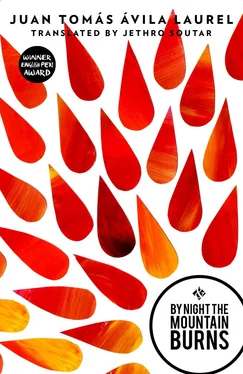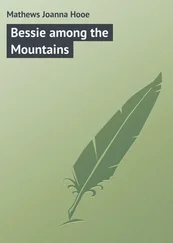Juan Ávila Laurel - By Night the Mountain Burns
Здесь есть возможность читать онлайн «Juan Ávila Laurel - By Night the Mountain Burns» весь текст электронной книги совершенно бесплатно (целиком полную версию без сокращений). В некоторых случаях можно слушать аудио, скачать через торрент в формате fb2 и присутствует краткое содержание. Год выпуска: 2014, Издательство: And Other Stories Publishing, Жанр: Современная проза, на английском языке. Описание произведения, (предисловие) а так же отзывы посетителей доступны на портале библиотеки ЛибКат.
- Название:By Night the Mountain Burns
- Автор:
- Издательство:And Other Stories Publishing
- Жанр:
- Год:2014
- ISBN:нет данных
- Рейтинг книги:5 / 5. Голосов: 1
-
Избранное:Добавить в избранное
- Отзывы:
-
Ваша оценка:
- 100
- 1
- 2
- 3
- 4
- 5
By Night the Mountain Burns: краткое содержание, описание и аннотация
Предлагаем к чтению аннотацию, описание, краткое содержание или предисловие (зависит от того, что написал сам автор книги «By Night the Mountain Burns»). Если вы не нашли необходимую информацию о книге — напишите в комментариях, мы постараемся отыскать её.
By Night the Mountain Burns — читать онлайн бесплатно полную книгу (весь текст) целиком
Ниже представлен текст книги, разбитый по страницам. Система сохранения места последней прочитанной страницы, позволяет с удобством читать онлайн бесплатно книгу «By Night the Mountain Burns», без необходимости каждый раз заново искать на чём Вы остановились. Поставьте закладку, и сможете в любой момент перейти на страницу, на которой закончили чтение.
Интервал:
Закладка:
Whenever it happened, and it always happened in the afternoon, the first people to see it would start yelling to let everyone else know: ‘Squid! Squid! Squid!’ That was all it took for everyone to come running and for the great squid festival to begin. There were huge piles of squid run aground on the beach in the big village. Piles and piles of them. Then more piles on the next beach, and more on the next beach after that, and so on; hundreds of squid landing on the shores of our island for no apparent reason. And down came men, women and children to harvest the bumper sea crop. And they went on shouting squid squid squid, and no one went without, and no one knew what to do with so much squid. And something needed to be done to provide for times of shortage. So, after the harvest was complete and all the squid that had spilled out from the Atlantic Ocean had been gathered in, decisions had to be made about how to make all that nourishment last for the days and months ahead. But before anything was decided, the island’s fishermen had made their preparations and were licking their lips in anticipation. For they knew squid meat was the perfect bait. With squid meat for bait, you could lure any fish onto your hook, even fish that usually only ate plants. And there was one fish in particular that was very fond of squid, a fish that swims in our waters and doesn’t have a name in Spanish, only in our language. It’s a flat fish and it must be an oily fish, for it has a blueish colour. We call it pámpan’a . And so the squid harvest was always eclipsed by the great pámpan’a harvest, and we thought we lived by the most bountiful sea in all the world, somewhere so bountiful that fish could just be plucked from the water. For the fishermen caught pámpan’a in such huge quantities … Amazing, truly amazing quantities. They caught so many that nobody, absolutely nobody, went without fish for several days. Even families with grandfathers who had no friends and refused to go to the beach to fraternise with the fishermen. Widows, single women, disabled men, recluses, men who didn’t fish because they had a different job, everyone, everywhere; no one went without a fish to boil in their pot. Fish was smoked, fried, salted, lightly boiled, the water used as the next day’s condiment, and everything came accompanied with what was left over from a few days ago, namely squid, boiled and salted. What huge quantities of seafood we ate! Truly amazing quantities! We could never have imagined, without seeing it before our eyes, that there were so many fish in the sea.
We ate the squid, we ate the pámpan’a, and later we experienced periods when we hungered for fish again. In truth, the people on the island didn’t appreciate the squid itself as much as they appreciated the marvel of its coming. Because the sudden abundance of squid was a mere prelude to that huge fish harvest, to what we considered the sea’s fertile season. We saw the sea as our island’s larder, the place where we kept the fish assigned to us; any man past adolescence could pick up his fishing tackle and go out to sea at any time, so long as it wasn’t stormy. And with such a larder at our disposal, households with men didn’t go as hungry as households without them. Or households with one who refused to have anything to do with the sea, even turned his back to it.
The sea’s resources seemed so readily available to us that people overlooked the need to make provisions for the times of shortage. Ways might have been found to make that huge quantity of fish last to cover less plentiful times, times when men went out to sea and came back complaining that it was too windy, that it was too calm, that little fish were eating the bait and stopping it reaching the bigger fish, that conditions basically weren’t right for fishing … Some efforts were made, fish were salted and smoked, the only preserving techniques the adults knew on our island, but the smoked and salted provisions soon ran out and then it was back to eating chillies again.
Wham! Blowing on your lips, and ouch if you touched yourself where you shouldn’t.
Fish was for us a product of primary necessity; as I’ve already said, if there was no fish, you didn’t eat. What I didn’t realise as a child was that the whole island suffered from disastrous shortages. Yes, they can be described as such. And maybe I didn’t realise the island suffered disastrous shortages because I didn’t wash my own clothes or light the lamp in our house. Therefore I didn’t know there was no soap on the whole island and I didn’t realise that kerosene was in such short supply that at a certain time at night we had to switch the lamp off or turn the flame down to preserve what little we had. Reducing the light’s intensity was a tricky operation and only grandmother did it well. It seemed like such a simple thing but really it wasn’t and if you hadn’t mastered it, and we little ones never mastered it, nor did our aunties, it was better not to get involved. Only grandmother did it well, and this was significant, for it might happen that the lamp went out in the middle of the night, leaving the house in total darkness, all because whoever had reduced the flame had not done so with a steady hand. Then grandmother would have to trouble herself with getting out of bed and calling for a neighbour in a low voice, asking if we might relight our lamp from hers. And grandmother did this because she believed that so many children under one roof ought not to spend the night without any light, in case something happened to one of us and some problem needed resolving. And why did she call on the neighbour in such a situation? Because the neighbour shared her sentiments and also kept the light on low all night. And because we didn’t have any matches in the house.
When the lamp went out for some reason before we’d gone to sleep, it constituted something of an education for me: I started to learn about our life and started to realise that things weren’t the way I’d always seen them. I started to realise that we didn’t have it so good. That kerosene, the liquid saviour, was scarce, that we had no matches and possibly no soap either. But how did all the kerosene lamps in our big village get lit? The same way the fires were lit. You took a coconut shell, with its leftover kernel, and went to the neighbour’s house, or to the neighbour’s neighbour, and asked for some burning embers. And you went back home and got some kindling you kept in the house and added it to the embers and the cuscús, which is what we call the kernel when it goes dry after all the oil is pounded out, and you lit the fire. If your neighbour had matches but already had a fire going in the stone tripod, she saved on a match and sent you into the kitchen to light your lamp. You had to kneel over the ashes, and this always betrayed what you’d been doing, though some people were able to squat and avoid getting dirty.
If your immediate neighbour had nothing to make fire with, you went to the next one, and from the next one to the next one, a hundred yards, two hundred, it didn’t matter, you might walk two hundred and fifty yards until you found someone with smoke coming out of their kitchen. Often what you did when you were sent out with the lamp was peer over the rooftops looking for smoke. Then you headed straight for where you saw it, avoiding having to go from house to house singing ‘Mum says can we have some fire?’ That’s what you said in our island’s language.
What with going from house to house asking for embers, a matchstick or a fireside to kneel over and stain your knees on, I realised that the adults on the island were exasperated by our situation and sought solutions in everything they could lay their hands on. But they could hardly lay their hands on anything, for our island was all alone at sea and there was no other land we could join forces with to combat our lack of everything. It was around then that I realised we islanders had no one to depend on but ourselves. That’s to say, we were on our own out in the middle of the Atlantic Ocean. People had given up hope of the boat ever coming back — the boat from the place where our fathers were. And in this great solitude, they stared out at the horizon all day, looking for a boat to appear that we could go and ask for things from. As children we saw how they rushed out to sea whenever they saw a stick on the horizon, thinking it might be a boat full of everything we needed. And they set off chasing after it with such conviction that they persuaded themselves the strength in their arms was equal to the power of the motor on the boat they were trying to catch. In any case, they tried, and they came back looking so disappointed it was as if they’d received confirmation that our situation was hopeless.
Читать дальшеИнтервал:
Закладка:
Похожие книги на «By Night the Mountain Burns»
Представляем Вашему вниманию похожие книги на «By Night the Mountain Burns» списком для выбора. Мы отобрали схожую по названию и смыслу литературу в надежде предоставить читателям больше вариантов отыскать новые, интересные, ещё непрочитанные произведения.
Обсуждение, отзывы о книге «By Night the Mountain Burns» и просто собственные мнения читателей. Оставьте ваши комментарии, напишите, что Вы думаете о произведении, его смысле или главных героях. Укажите что конкретно понравилось, а что нет, и почему Вы так считаете.












